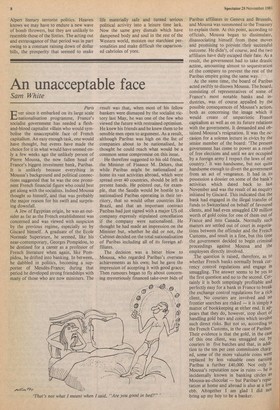An unacceptable face
Sam White
Paris
ver since it embarked on its large scale nationalisation programme, France's socialist government has needed a fleshand-blood capitalist villain who would symbolise the unacceptable face of French capitalism. An easy enough task, one would have thought, but events have made the choice for it in what would have seemed only a few weeks ago the unlikely person of Pierre Moussa, the now fallen head of France's biggest investment bank, Paribas. It is unlikely because everything in Moussa's background and political connections suggested that he was the one prominent French financial figure who could best get along with the socialists. Indeed Moussa thought so himself, and that was probably the major reason for his swift and surprising downfall.
A Jew of Egyptian origin, he was an outsider as far as the French establishment was concerned and was viewed with suspicion by the previous regime, especially so by Giscard himself. A graduate of the Ecole Normale Superieure, he seemed, like his near-contemporary, Georges Pompidou, to be destined for a career as a professor of French literature when again, like Pompidou, he drifted into banking. In between, he dabbled in politics, becoming a supporter of Mendes-France; during that period he developed strong friendships with many of those who are now ministers. The result was that, when most of his fellow bankers were dismayed by the socialist victory last May, he was one of the few who viewed the future with restrained optimism. He knew his friends and he knew them to be sensible men open to argument. As a result, although Paribas was high on the list of companies about to be nationalised, he thought he could reach what would be a common sense compromise on this issue.
He therefore suggested to his old friend, the Minister of Finance M. Delors, that while Paribas might be nationalised at home its vast activities abroad, which were spread over 40 countries, should be left in present hands. He pointed out, for example, that the Saudis would be hostile to a nationalised Paribas operating in their territory, that so would other countries like Brazil, and that an important contract Paribas had just signed with a major US oil company expressly stipulated concellation if the company were nationalised. He thought he had made an impression on the Minister but, whether he did or not, the Cabinet decided on the total nationalisation of Paribas including all of its foreign affiliates.
The decision was a bitter blow to Moussa, who regarded Paribas's overseas achievements as his own; but he gave the impression of accepting it with good grace. Then rumours began to fly about concerning mysteriously financed take-over bids of Paribas affiliates in Geneva and Brussels, and Moussa was summoned to the Treasury to explain them. At this point, according to officials, Moussa began to dissimulate, disassociating himself from these moves and promising to prevent their successful outcome. He didn't, of course, and the two affiliates have duly escaped their fate. As a result, the government had to take drastic action, amounting almost to sequestration of the company to prevent the rest of the Paribas empire going the same way.
At the same time, the board of Paribas acted swiftly to disown Moussa. The board, consisting of representatives of some of France's most notable banks and industries, was of course appalled by the possible consequences of Moussa's action, both as concerning the image which it would create of unpatriotic France capitalism as well as on its future relations with the government. It demanded and obtained Moussa's resignation. It was the occasion for a solemn lecture in civics by the senior member of the board: 'The present government has come to power as a result of free elections and until we are occupied by a foreign army I respect the laws of my country.' It was handsome, but not quite handsome enough to divert the government from an act of vengeance. It had in its possession a dossier on some of the bank's activities which dated back to last November and was the result of an enquirY initiated by Giscard. This indicated that the bank had engaged in the illegal transfer of funds to Switzerland on behalf of favoured clients, and had even smuggled £30 million worth of gold coins for one of them out of France and into Canada. Normally such matters are settled out of court in negotiations between the offender and the French Customs, and result in a fine, but this time the government decided to begin criminal proceedings against Moussa and the employees directly involved.
The question is raised, therefore, as to whether French banks normally break currency control regulations and engage in smuggling. The answer seems to be yes to the first question and no to the second. Certainly it is both temptingly profitable and perfectly easy for a bank in France to break the exchange control regulations for a rich client. No couriers are involved and no frontier searches are risked — it is simply a matter of bookkeeping at either end. It appears that they do, however, stop short of handling gold bars and coins which involve such direct risks. But not so, according to the French Customs, in the case of Paribas. Their evidence is that the gold, in the case of this one client, was smuggled out by couriers in five batches and that, in addition to the ten per cent commission charged, some of the more valuable coins were replaced by less valuable ones earning Paribas a further £40,000. Not only is Moussa's reputation now in ruins — he is incidentally known in banking circles as Moussa-au-chocolat — but Paribas's reputation at home and abroad is also at a low ebb. Altogether I am glad I did not bring up my boy to be a banker.














































 Previous page
Previous page